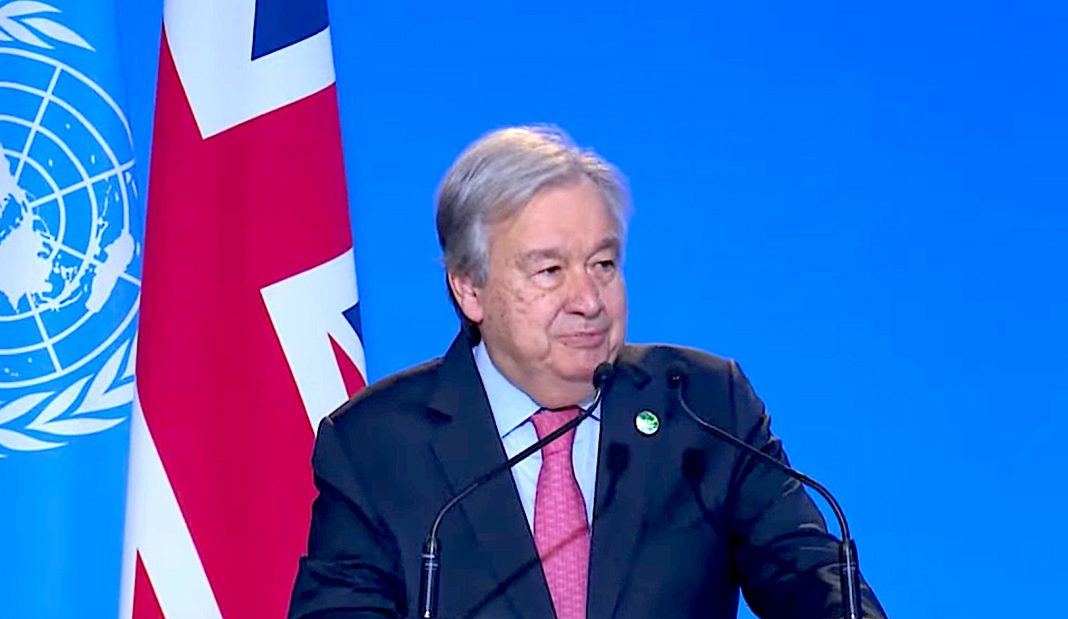By Janet Ekstract
GLASGOW- The Glasgow Climate Pact is the name the UN has given to the final agreement reached at the United Nations Climate Conference COP26 that was still in final negotiations on the agreement’s wording on Saturday. As UN Secretary-General Antonio Guterres said: “We must end fossil fuel subsidies. Phase out coal. Put a price on carbon. Protect vulnerable communities. And make good on the $100 billion climate finance commitment to support developing countries. We didn’t achieve that at COP26, but we have building blocks for progress.”
The most contentious issue centers around whether wealthy nations in the developed world should be obliged to set up an official fund to pay liabilities to poorer countries for climate crisis impacts. Poorer nations have called for $100B in financial assistance to combat their climate crises. To that end, the UK has pledged 290M pounds sterling for poorer nations while several charities have agreed to donate an initial $3 million dollars to kickstart the funding for those nations. Entitled the “Glasgow Loss and Damage Facility” – this organization will facilitate money to poor nations for irreversible damage from climate shocks. The fund hopes to inspire rich nations to donate though they initially opposed the concept of such a fund.
COP26 negotiations were still underway on Saturday as negotiators in Glasgow mulled over a new agreement with the goal of skirting the worst impacts of climate change. It was the lack of consensus on fossil fuels and assistance to poorer nations that had stalled finishing the final agreement. Finally, representatives from China and India pushed to change language in the COP26 agreement that requested countries “phase-down” continuous coal use rather than “phase-out” its use. COP26 President Alok Sharma was in favor of using stronger worded language for fossil fuels in the agreement as were a multitude of the 197 countries’ delegates. Sharma said using tougher language was “vital” to protect the deal but there were concerns that using the term ‘phase-out’ would give coal-dependent countries such as China and India excuses to avoid stronger commitments on emissions reduction. In order to keep the goal of maintaining the Earth’s temperature at 1.5C then there must be a 45 percent reduction in global gas emissions by 2030 and to net zero by 2050.
Meanwhile, the deal that was reached plans to stick to the Paris Agreement that states the global temperature must remain at 1.5C but concerns remain about the pact not holding countries accountable to stricter standards which would include the move away from using coal as an energy source. Climate activists and environmental chiefs say they are outraged that the current agreement falls extremely short of what actually needs to be done in the current dire climate crisis. A number of activists were also critical of wealthy nations for not acting on previous promises to assist poorer countries with $100 billion a year for climate assistance through 2023. The Glasgow deal only commits to creating a new plan over the next three years.
The Glasgow Climate Pact requests that countries “revisit and strengthen” their climate change plans prior to the end of 2022. The new pact contains a strategy to address long-running disputes over global carbon credit markets, according to the publication New Scientist. While a multitude of countries attending COP26 pledged to reduce methane emissions and halt deforestation – China and the US reached a deal to limit climate change in the 2020s. This includes a new recognition from China acknowledging that methane has a major impact on rising temperatures.
According to environmental experts, climate activists and a number of observers, ‘Loss and Damage’ is the most politically charged issue in the climate action arena. As Executive Director of Greenpeace International Jennifer Morgan commented – the new pact eliminates any wording that would indicate a way to provide financing support for technical assistance to poorer nations to cope with losses and damages the severe effects of accelerated greenhouse gas emissions that she said wealthy countries have been emitting for decades.
Environmental lawyer Farhana Yamin who works closely with vulnerable countries said that the pact’s new text is “appalling.” She added that unless the text is changed, that this pact will “go down in history as having failed all tests of moral and political credibility.” In addition, Saleemul Huq, an adviser to the Climate Vulnerable Forum – a coalition of 48 countries, commented in a tweet that the language on loss and damage in the pact “has, in fact, gone BACKWARDS from yesterday’s text.” Huq spoke to Al-Jazeera International, acknowledging that much more needs to be done in terms of phasing out a reliance on fossil fuels.
Despite the misgivings about the new climate pact, there was significant progress made on key issues. A significant agreement made was the one between the US and China to work harder to cut emissions with China agreeing to develop a plan to reduce methane, considered to be the worst greenhouse gas. China also agreed to phase-down coal by 2026 but still doesn’t have a set plan in place. Meanwhile, leaders in over 100 countries agreed to end deforestation by 2030 which includes Brazil, China, the US and Russia. This historical deforestation agreement covers 85 percent of the world’s forest that are crucial to absorbing carbon dioxide and slowing the pace of global warming. At least 12 governments committed $12 billion and private companies pledged $7 billion to protect and restore forests in a variety of ways to include $1.7 billion in funding for indigenous peoples.
Probably the most significant step taken by over 100 nations at COP26 was their agreement to cut methane emissions by 30 percent by the end of this decade. This pledge is part of a push by the Biden administration who also announced the Environmental Protection Agency (EPA) will limit methane coming from close to one million oil and gas rigs across the US. Countries that signed the global methane pledge include half of the world’s top 30 methane producers.




